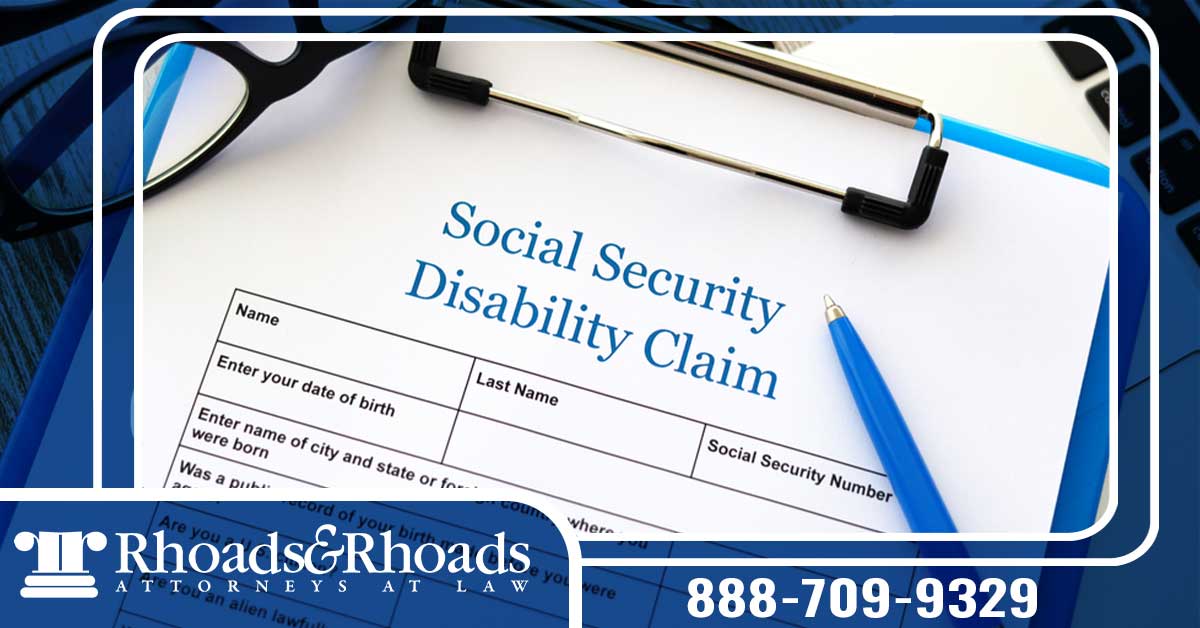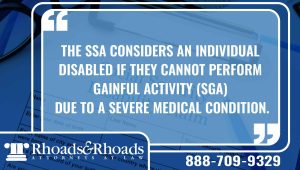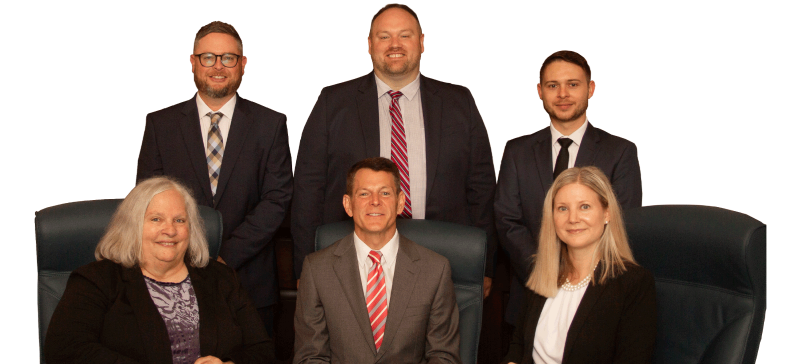
The Federal Insurance Contributions Act created the Social Security Trust Fund to financially support individuals who are unable to work due to chronic illness or injury. It was created to help people but it can be overwhelming to navigate.
Rhoads & Rhoads created this article to help you explore the Social Security disability programs, eligibility criteria, types of disabilities recognized by the SSA, and when you need an experienced attorney to help you receive SSI benefits.
How The Social Security Administration Determines Disability

The program, administered by the Social Security Administration (SSA), offers disability benefits to people unable to work. Each applicant goes through a disability determination process to determine what SSI or SSDI benefits for which they may qualify, including how much the SSA will pay the person with a monthly check.
To qualify for benefits, individuals must meet the strict eligibility criteria set forth by the Social Security Administration (SSA) in their blue book, including:
- Inability to Work: The SSA considers an individual disabled if they cannot perform gainful activity (SGA) due to a severe medical condition. SGA typically involves earning a certain monthly income from your job.
- Severity of Impairment: Medical sources must show the restriction is severe enough to interfere with basic work-related activities, lasting for at least 12 months, or expected to result in death.
- Medical Evidence: Applicants must provide medical evidence from their doctor(s) documenting the severity of their impairment and its impact on their ability to work.
In addition to the above requirements, work credits are typically required to qualify for Social Security Disability Insurance (SSDI), while Supplemental Security Income (SSI) has income and resource limitations.
Types of Disabilities Covered by Social Security Disability Insurance
Physical, mental, and cognitive impairments may qualify you for monthly payments. People are born with some conditions that qualify, while others develop as adults age or are injured.
Common types of disabilities recognized by the SSA include:
- Musculoskeletal System Disorders: Conditions such as arthritis, back injuries, and chronic pain can significantly limit an individual’s ability to perform tasks required for a job.
- Mental and Emotional Health Disorders: Mental illnesses like depression, anxiety disorders, bipolar disorder, and schizophrenia interfere with daily activities and work performance.

- Neurological Disorders: Multiple sclerosis (MS), epilepsy, Amyotrophic Lateral Sclerosis (ALS), Parkinson’s disease, and traumatic brain injuries (TBI) affect mobility, coordination, and cognitive function.
- Cardiovascular Conditions: Heart disease, congestive heart failure, and other cardiovascular disorders can limit an individual’s ability to engage in basic activities and require extensive medical care.
- Respiratory Disorders: Chronic obstructive pulmonary disease (COPD), asthma, and other respiratory conditions can limit exertion, impacting an individual’s ability to work.
- Immune System Disorders: Diseases like HIV/AIDS, lupus, and rheumatoid arthritis can weaken the immune system and cause debilitating symptoms that interfere with daily life and work
- Cancer: Certain types of cancer and their treatments can result in severe limitations, fatigue, and other symptoms that may prevent individuals from working.
- Congenital Disorders: Conditions a child is born with, like Down Syndrome, some metabolic disorders, and immune disorders, can create lifelong limitations.
- Blindness: Partial or full loss of vision can be debilitating at any age. The SSA offers benefits to those who are blind to offset the lack of accessibility they will encounter in most settings.
Wonder if you qualify for disability programs? Reach out today for a disability evaluation from one of our attorneys or call us at 888-709-9329.
What Monetary (Cash) Disability Benefits Are Available?
If you meet the definition set forth in the blue book, you may be eligible for one of two main types of benefits offered by the Social Security Administration (SSA):
Social Security Disability Insurance (SSDI) Benefits: The SSDI program provides benefits to individuals who have worked and made contributions to the Social Security system. To qualify for SSDI, applicants must have enough work credits based on their earnings history.
Supplemental Security Income (SSI) Benefits: SSI is a needs-based program that provides financial assistance to disabled adults and children with limited income and resources. Unlike SSDI, SSI payments do not require individuals to earn work credits or be a certain age.
Although there are important differences, both SSDI and SSI provide monthly cash disability payments to eligible individuals to help cover basic living expenses such as food, shelter, and clothing.
What Monetary (Non-Cash) Disability Benefits Are Available Through The SSI Program?
Medicare or Medicaid Health Insurance: Medicare or Medicaid insurance helps disabled individuals manage their health conditions effectively and maintain their overall well-being.
Vocational Rehabilitation and Employment Services: Individuals with disabilities may benefit from vocational rehabilitation programs and resources that help them return to work or transition to new work opportunities.
Housing and Utility Assistance: Disabled individuals may also receive financial support or discounts on housing and essential utilities such as electricity, water, and heating.
Homestead Exemption: Disabled individuals may be entitled to tax benefits or set-off on their home or primary residence.
How An Experienced Kentucky Social Security Disability Lawyer Can Help You Get Disability Benefits
Navigating the Social Security Disability system can be daunting, especially for individuals dealing with disabilities and health challenges.
A knowledgeable attorney can assist with:
- Gathering Evidence: An attorney can help gather medical records, doctor’s opinions, and other evidence necessary to support the disability claim.
- Completing Forms and Documentation: The application involves extensive paperwork, and an attorney can ensure that all forms are completed accurately and submitted on time.
- Navigating Appeals: If a disability claim is denied, an attorney can represent the applicant in the appeal, presenting arguments and evidence to support their case before an administrative law judge.
- Maximizing Benefits: An experienced lawyer understands how to maximize disability benefits for their clients, ensuring they receive the financial support they deserve.
Common Reasons for Denial of Your Request for Social Security Disability or Supplemental Security Income

Despite meeting the eligibility criteria, many disability claims are denied by the SSA. Common factors contributing to denials include insufficient evidence from medical sources, failure to meet disability (physical or mental impairment), the duration requirement, or technical errors in the application.
You Earn Too Much Money
Often, the SSA denies claims because the applicant’s earnings exceed the maximum. You cannot receive disability benefits if you are still working and earning too much because the SSA says you have ‘Substantial Gainful Activity’.
Consistent earnings indicate to the SSA that you can perform significant mental or physical activities and do not need SSI or SSDI. The income level is different if you are blind.
You Will Be Disabled for Less Than One Year
The SSA has a 12-month duration requirement or your issue is likely to result in your death. This means you cannot work because of a medical condition expected to last at least a continuous period of one year.
Your Disability Is Based on Drug or Alcohol Abuse(DAA)
The SSA will deny your application if you wouldn’t be disabled if you stopped using drugs or alcohol. The SSA may allow your claim if the DAA does cause or affect your impairment if you can prove other medical conditions would not improve if you stopped using drugs or alcohol.
You Didn’t Follow Doctor’s Orders
It’s common for the SSA to deny your claim if you don’t follow your doctor’s orders. There are exceptions for religious objections, financial limitations, or if the disability prevents you from accessing your doctor for treatment.
The SSA Is Unable to Contact You, or You Don’t Cooperate
The SSA often contacts claimants and they may deny your claim if you are unreachable. If the SSA can’t find you or you fail to cooperate, the SSA will decide your claim based on the evidence of record.
If you do not have telephone numbers you can be reached at, you can give the SSA the name of a third-party person who will know how to reach you.
Your Disability Is Connected to a Criminal Conviction
You are jailed for 30 days or more if your severe functional limitations occurred (or worsened) while in prison or during the commission of a felony.
Reach out to us today for a free consultation where we can discuss specific circumstances that might impact your disability case or call us at 888-709-9329.
Can I Appeal?
If Social Security’s disability determination services say you are not eligible, applicants have the right to challenge the decision through the SSA.
Don’t try to file an appeal alone because the SSI and SSDI appeals process is complicated.
Rhoads & Rhoads SSDI Lawyers
Navigating the Social Security system can be complex and challenging, but Rhoads & Rhoads is here to help you navigate social security disability programs.
If you, your spouse, or a loved one are applying for Social Security Disability Programs or need assistance with an appeal, contact us today for a consultation. Call the firm today at 888-709-9329.


